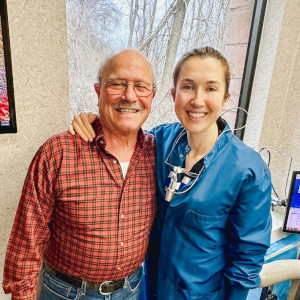At Pinnacle Center – Dental Implants & Periodontics, we understand the crucial role your oral health plays in your overall well-being. Gum disease, also known as periodontal disease, is a common condition that can have serious implications if left untreated. Our experienced team, led by Dr. Katherine L. Roll and Dr. Kelly B. Williams, is dedicated to providing you with effective and personalized gum disease treatment options. This guide will help you understand the importance of gum health, the various treatment options available, and how we can support you in maintaining a healthy smile.
Understanding Gum Disease
Gum disease is an infection of the tissues that surround and support your teeth. It is typically caused by poor oral hygiene, which allows plaque—a sticky film of bacteria—to build up on the teeth and harden. There are two main stages of gum disease: gingivitis and periodontitis.
- Gingivitis: This is the earliest stage of gum disease, characterized by red, swollen gums that may bleed easily. At this stage, the damage is reversible with proper dental care and good oral hygiene.
- Periodontitis: If left untreated, gingivitis can progress to periodontitis, a more severe form of gum disease. This stage involves inflammation and infection that can destroy the gums, bones, and tissues supporting the teeth. It can lead to tooth loss and other serious health issues.
Common symptoms of gum disease include bleeding gums, bad breath, receding gums, and loose teeth. Risk factors include smoking, hormonal changes, diabetes, certain medications, and genetic predisposition.
The Importance of Early Detection and Treatment
Early detection and treatment of gum disease are essential to prevent further complications. When caught in the early stages, gum disease can be managed and even reversed. However, if left untreated, it can lead to significant oral and systemic health problems, such as tooth loss and an increased risk of heart disease, stroke, and diabetes.
Regular dental check-ups and cleanings are crucial for detecting gum disease early. Our team at Pinnacle Center – Dental Implants & Periodontics is committed to helping you maintain optimal oral health through comprehensive examinations and personalized treatment plans.
Comprehensive Gum Disease Treatment Options
At Pinnacle Center, we offer a variety of treatment options tailored to your specific needs. Our goal is to provide effective and minimally invasive treatments to restore your gum health and prevent further damage.
Non-Surgical Treatments
- Scaling and Root Planing: Also known as deep cleaning, this procedure involves removing plaque and tartar from below the gum line and smoothing the tooth roots to prevent bacteria from reattaching.
- Antibiotic Therapy: To control bacterial infection, antibiotics may be prescribed in the form of oral medication or topical gels applied directly to the gums.
Surgical Treatments
- Osseous Surgery: This procedure involves folding back the gum tissue to remove bacteria and smooth damaged bone, reducing the depth of periodontal pockets and making it easier to keep the area clean.
- Regenerative Procedures: When the bone and tissue supporting the teeth have been destroyed, regenerative techniques such as bone grafts and tissue-stimulating proteins can help regenerate lost bone and tissue.
- Soft Tissue Grafts: To treat receding gums, soft tissue grafts involve taking tissue from another part of the mouth and attaching it to the affected area to cover exposed roots and reduce sensitivity.
- Gingivectomy: This surgical procedure involves removing and reshaping loose, diseased gum tissue to eliminate pockets between the teeth and gums where bacteria thrive.
- Guided Tissue Regeneration (GTR): This technique uses a barrier membrane to direct the growth of new bone and tissue at sites with insufficient volume or dimensions.
Periodontal Maintenance
After initial treatment, ongoing periodontal maintenance is crucial to prevent the recurrence of gum disease. This includes regular cleanings, thorough at-home oral hygiene practices, and periodic evaluations. Our team will work with you to create a customized maintenance plan that fits your needs, ensuring your gums remain healthy and your smile stays bright.
Advanced Techniques and Technology
At Pinnacle Center, we utilize advanced technology to provide you with the best possible care. Our use of digital imaging allows for precise diagnosis and treatment planning, ensuring that your treatment is effective and tailored to your specific condition. These cutting-edge techniques help reduce discomfort, speed up recovery times, and improve overall treatment outcomes.
Personalized Treatment Plans
Every patient is unique, and so is their treatment plan. We take the time to understand your specific needs and develop a comprehensive plan that addresses all aspects of your gum health. Our thorough examination and diagnosis process allows us to identify the best course of action for your situation. We believe in a collaborative approach, working closely with you to ensure you are comfortable and informed throughout your treatment journey.
Maintaining Healthy Gums Post-Treatment
Maintaining healthy gums after treatment is essential to prevent the recurrence of gum disease. Here are some tips to help you keep your gums healthy:
- Brush and Floss Regularly: Brush your teeth at least twice a day and floss daily to remove plaque and food particles from between your teeth and along the gum line.
- Regular Cleanings: Schedule regular dental cleanings with our team to remove plaque and tartar buildup that you may miss during your daily oral hygiene routine.
- Healthy Lifestyle: Avoid smoking, eat a balanced diet, and manage underlying health conditions such as diabetes to reduce your risk of gum disease.
Schedule Your Consultation and Take Action Today
Treating gum disease is essential for maintaining not only your oral health but also your overall well-being. At Pinnacle Center – Dental Implants & Periodontics, we are committed to providing you with comprehensive, personalized care to address your gum health needs. If you are experiencing symptoms of gum disease or want to ensure your gums are healthy, schedule an appointment with us today. Our compassionate and experienced team is here to help you achieve and maintain optimal oral health.







